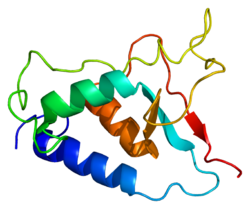USP15
Appearance
Ubiquitin carboxyl-terminal hydrolase 15 is an enzyme that in humans is encoded by the USP15 gene.[4][5]
Ubiquitin (MIM 191339), a highly conserved protein involved in the regulation of intracellular protein breakdown, cell cycle regulation, and stress response, is released from degraded proteins by disassembly of the polyubiquitin chains. The disassembly process is mediated by ubiquitin-specific proteases (USPs). Also see USP1 (MIM 603478).[supplied by OMIM][5]
References
- ^ a b c GRCm38: Ensembl release 89: ENSMUSG00000020124 – Ensembl, May 2017
- ^ "Human PubMed Reference:". National Center for Biotechnology Information, U.S. National Library of Medicine.
- ^ "Mouse PubMed Reference:". National Center for Biotechnology Information, U.S. National Library of Medicine.
- ^ Puente XS, Sanchez LM, Overall CM, Lopez-Otin C (Jul 2003). "Human and mouse proteases: a comparative genomic approach". Nat Rev Genet. 4 (7): 544–58. doi:10.1038/nrg1111. PMID 12838346. S2CID 2856065.
- ^ a b "Entrez Gene: USP15 ubiquitin specific peptidase 15".
Further reading
- Nakajima D, Okazaki N, Yamakawa H, et al. (2003). "Construction of expression-ready cDNA clones for KIAA genes: manual curation of 330 KIAA cDNA clones". DNA Res. 9 (3): 99–106. doi:10.1093/dnares/9.3.99. PMID 12168954.
- D'Andrea A, Pellman D (1999). "Deubiquitinating enzymes: a new class of biological regulators". Crit. Rev. Biochem. Mol. Biol. 33 (5): 337–52. doi:10.1080/10409239891204251. PMID 9827704.
- Ewing RM, Chu P, Elisma F, et al. (2007). "Large-scale mapping of human protein–protein interactions by mass spectrometry". Mol. Syst. Biol. 3 (1): 89. doi:10.1038/msb4100134. PMC 1847948. PMID 17353931.
- Beausoleil SA, Villén J, Gerber SA, et al. (2006). "A probability-based approach for high-throughput protein phosphorylation analysis and site localization". Nat. Biotechnol. 24 (10): 1285–92. doi:10.1038/nbt1240. PMID 16964243. S2CID 14294292.
- de Jong RN, Ab E, Diercks T, et al. (2006). "Solution structure of the human ubiquitin-specific protease 15 DUSP domain". J. Biol. Chem. 281 (8): 5026–31. doi:10.1074/jbc.M510993200. PMID 16298993.
- Hetfeld BK, Helfrich A, Kapelari B, et al. (2005). "The zinc finger of the CSN-associated deubiquitinating enzyme USP15 is essential to rescue the E3 ligase Rbx1". Curr. Biol. 15 (13): 1217–21. doi:10.1016/j.cub.2005.05.059. PMID 16005295. S2CID 15396259.
- Soboleva TA, Jans DA, Johnson-Saliba M, Baker RT (2005). "Nuclear-cytoplasmic shuttling of the oncogenic mouse UNP/USP4 deubiquitylating enzyme". J. Biol. Chem. 280 (1): 745–52. doi:10.1074/jbc.M401394200. PMID 15494318.
- Ota T, Suzuki Y, Nishikawa T, et al. (2004). "Complete sequencing and characterization of 21,243 full-length human cDNAs". Nat. Genet. 36 (1): 40–5. doi:10.1038/ng1285. PMID 14702039.
- Angelats C, Wang XW, Jermiin LS, et al. (2003). "Isolation and characterization of the mouse ubiquitin-specific protease Usp15". Mamm. Genome. 14 (1): 31–46. doi:10.1007/s00335-002-3035-0. PMID 12532266. S2CID 23215004.
- Strausberg RL, Feingold EA, Grouse LH, et al. (2003). "Generation and initial analysis of more than 15,000 full-length human and mouse cDNA sequences". Proc. Natl. Acad. Sci. U.S.A. 99 (26): 16899–903. doi:10.1073/pnas.242603899. PMC 139241. PMID 12477932.
- Baker RT, Wang XW, Woollatt E, et al. (1999). "Identification, functional characterization, and chromosomal localization of USP15, a novel human ubiquitin-specific protease related to the UNP oncoprotein, and a systematic nomenclature for human ubiquitin-specific proteases". Genomics. 59 (3): 264–74. doi:10.1006/geno.1999.5879. PMID 10444327.
- Nagase T, Ishikawa K, Miyajima N, et al. (1998). "Prediction of the coding sequences of unidentified human genes. IX. The complete sequences of 100 new cDNA clones from brain which can code for large proteins in vitro". DNA Res. 5 (1): 31–9. doi:10.1093/dnares/5.1.31. PMID 9628581.




